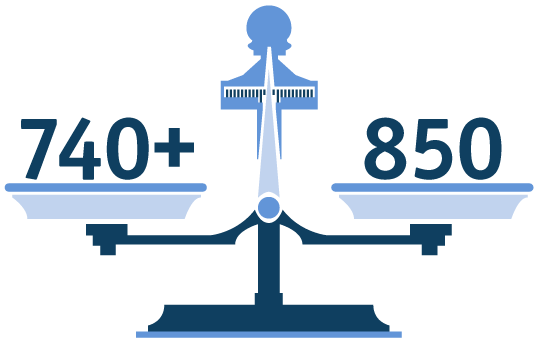Every consumer who has ever had a credit card or any other type of loan has a credit history with each of the three major consumer credit bureaus; Equifax, Experian, and TransUnion. Rather than pouring through pages of your credit report, most lenders have simplified the process by purchasing each applicant's credit score. A credit score is a number that is the result of a complex and secret formula applied to your credit report.
The most popular of these formulas is from the Fair Isaac Corporation (FICO). A FICO credit score ranges from 300-850, although those numbers typically represent extreme outliers. The vast majority of American's credit scores are well above 300 and significantly below 850. A credit score is calculated based on factors such as your history of payments, amounts owed (balances), length of credit history, types of credit used, and new accounts. Credit scores in the mid-600′s on up to 740 are considered good credit, while those above 740 are considered excellent.
Higher is Not Always Better
If you pay your bills on-time and have very little debt, you will almost certainly have a credit score around 740, which is considered excellent credit. With a credit score that high, you will qualify for the lowest interest rates available and will be approved for the best credit card offers available. But here's the trick; if your credit score rises to 780, you will still qualify for the lowest interest rates available and be approved for any credit card you apply for. If your credit score reaches 820 or even hit that magical 850 score, then you will still qualify for the lowest interest rates available and be approved for any credit card you apply for. You see a trend here? There are no additional benefits to consumers who strive to reach a credit score above 740 (versus an 850).
Think of it like this; a 740 credit score is the equivalent of an A+, and there is no such thing as A+++++. If you have a credit score significantly above 740, then I suppose you can brag about it to your friends, but you won't receive any benefits above what you would have if your score was just 740. Even if your dream is to get approved for the prestigious Black Card by American Express, having a perfect credit score of 850 still won't matter because those are largely issued based on income or "status," not by credit score.
How a Credit Score Can Be Too High
To reach a credit score above 800, just paying your bills on time and avoiding debt won't do, you have to be extremely conservative with all of your personal finances. This means not applying for new lines of credit or generating inquiries, while comparison shopping for the best loans. By doing so, you will miss out on the lowest interest rates and some very generous sign-up bonuses from new credit card accounts. In short, the costs of having an ultra-high credit score can be desirable; however, the rewards for doing so are non-existent, beyond mere bragging rights.
That being said, I wouldn't necessarily settle for a credit score of just 740 since there are so many variables that could cause your credit score to dip slightly from time to time. The most obvious reason is that there are three major consumer credit bureaus, and your score will vary slightly with each since they typically use different credit scoring formulas, and because some accounts are reported to one or two bureaus, instead of all three. In addition, there are relatively benign activities that can lower your score slightly, and temporarily, such as applying for a new credit card or loan or closing an account. If you've noticed fluctuations in your score around 40 points of difference, you will want to maintain a credit score in the 750-800 range. This gives you a little cushion against small credit score divots, as well as a margin of error against mistakes.
The Good News
Overall, there is no reason for you to become obsessed with the minutia of the mysterious credit scoring formulas if you already have an excellent credit score. After all, excellent is excellent; there is no super excellent credit category. Continue to pay your bills on time, keep your credit utilization low, and use credit only when needed and it should be very easy to maintain excellent credit, no matter what you do.
This article originally appeared on www.comparecards.com/blog: Can Your Credit Score Be Too High?
* Editorial Note: This content is not provided or commissioned by the credit card issuer. Any opinions, analyses, reviews or recommendations expressed in this article are those of the author's alone, and have not been reviewed, approved or otherwise endorsed by the credit card issuer. This site may be compensated through the credit card issuer Affiliate Program.
*The content in this article is accurate at the publishing date, and may be subject to changes per the card issuer.

